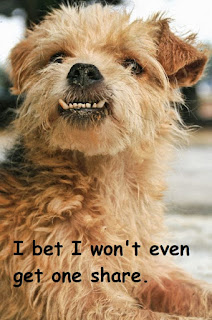The term “like farming” is defined in the Oxford Dictionary of Media and Communication as
“The cynical practice of creating a Facebook page with popular or viral content, such as heart-rending but bogus appeals for support with a plea to ‘share this’, in order to use it for posting ads and links when the likes reach a substantial number (or to sell it to someone else for the same purpose).”
Like farmers use several methods to persuade people to share pictures:
(1) People are persuaded to feel sorry for a person or animal (see above) and share their picture, usually via an emotive appeal, such as, “I bet I won’t even get one share!” These images are generally taken from elsewhere on the internet and used without the permission or knowledge of the person who first shared them, so you cannot encourage them by sharing their picture.
(2) A like-farming page shows a picture of someone who is seriously ill (often a child) and says that Facebook will pay a certain amount of money (usually £1 or $1) for that person’s treatment every time the post is shared. They won’t! Again, the photo will have been used without the person’s permission.
(3) A like-farming page posts a picture of something that can be won by sharing the post and/or commenting on it. It’s usually something expensive, such as a car, camper van or even a house. In this case, a page is often set up specifically for this “promotion.” No one will win anything.
Before sharing anything on Facebook, it’s worth checking its origin to avoid being exploited by like farmers.
If you’d like to learn more about like farming and how to spot it, I recommend this article by Hoax-Slayer. This organisation has its own Facebook page as well as a web page and provides a lot of useful information on internet hoaxes or scams.
Photo credit: Alejandro Arango (Creative Commons)
